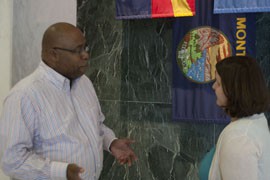Cronkite News has moved to a new home at cronkitenews.azpbs.org. Use this site to search archives from 2011 to May 2015. You can search the new site for current stories.
State officials push plan to ‘reinvent’ social services during Washington visit
WASHINGTON – The director of the Arizona Department of Economic Security was in Washington this week pushing his plan to “reinvent” the state’s safety net and create a streamlined system to better serve the needy.
Clarence H. Carter said Thursday he has met with federal agencies, policy groups and others, as he tries to win waivers from the federal government to move forward with his plan for a “comprehensive, integrated approach” to the safety net.
“The safety net is flawed,” Carter said. “Right now, we force individuals into many different doors to be served” instead of just one integrated system.
Arizona currently has more than 1.6 million people, about 20 percent of the state’s population, receiving assistance through 42 state-run safety net programs, as well as others outside the state system.
The department’s plan would streamline those different programs, “knitting everything together to grow capacity of safety-net consumers,” Carter said.
The proposed reinvention, unveiled earlier this month, calls for a shift in focus from delivering benefits to one of assisting recipients, through closer coordination between caseworkers, an assessment and improvement plan and incentives for becoming independent.
“We don’t have a plan to move people out of the system,” said Carter of the current safety net system. “We foster dependency.”
The department has proposed beginning a demonstration of the new plan later this year with people in the Supplemental Nutrition Assistance, or food stamp, program. That’s what brought state officials to Washington.
He said the state’s proposal has been generally well received in his meetings in Washington this week, but that most have doubts that it can succeed.
“Everybody scratches their head wondering how you accomplish this,” Carter said.
He faults individual programs as “designed to address a singular aspect of the human condition” instead of being interconnected with other programs. He compared programs like SNAP to a flawed silo with “limited objectives.”
Carter hopes the initiative will change the safety net programs of Arizona for the better by helping people move out of the system, and by doing so, providing those who rely on the system more focus and help.
He called the initiative an “intentional, incremental strategy.
“We won’t solve all problems tomorrow afternoon,” Carter said.
Still, he recognizes that it would be a significant public policy change.
“There’s no shared vision for the safety net,” said Carter. “It’s like the saying, ‘If you don’t know where you’re going, any road will get you there.’”







